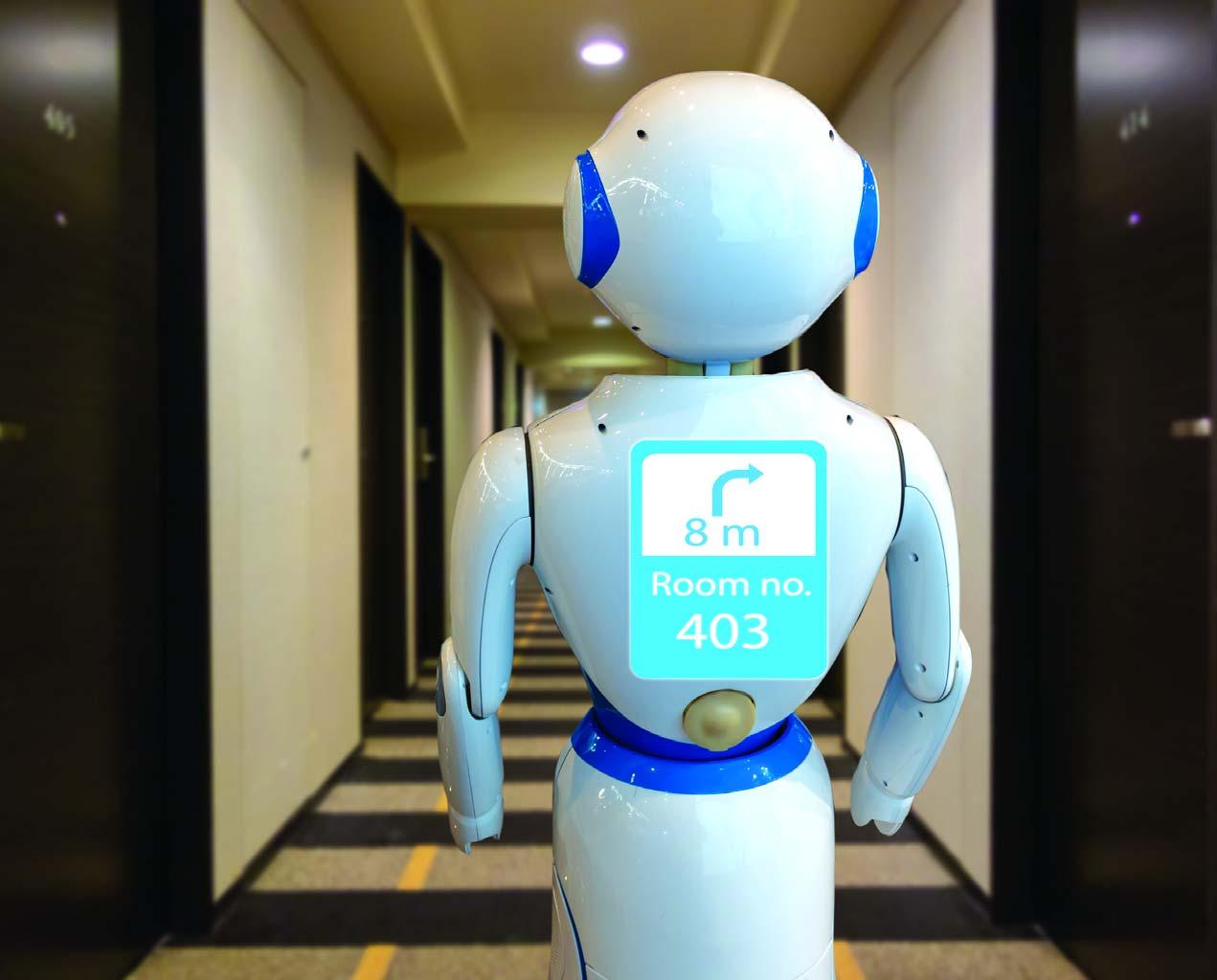
9 minute read
OVERCOMING THE BARRIERS TO HOSPITALITY 4.0
As the world moves towards the Fourth Industrial Revolution, more advanced technologies are being utilised today with the goal of improving productivity across industries. However, revolutionary change does not occur overnight and there remain barriers in ensuring the smooth transition to Industry 4.0, says Martyn Cox, event director, FHA - HoReCa
Within the hospitality industry, there is still uncertainty among businesses due to the perception that the move towards Industry 4.0 could undermine the value of human interactions which forms the foundation of exceptional customer service. Furthermore, many businesses struggle to utilise the right technologies where it truly matters, thus leading to greater insecurity towards the benefits Hospitality 4.0 could bring.
While such concerns are valid, there is potential to mitigate them to allow hospitality players to methodically find its footing in the new digital age, rather than diving head-first without the proper preparation and understanding.
Harnessing digitalisation to boost employee value
Digital transformation has made an already crowded hospitality industry even more competitive, with businesses constantly jostling for position in an ongoing battle to win loyal customers and market share by adopting the latest technologies.
But can machines replace humans in the hospitality industry? Will digitalisation render human interactions – core to a positive customer experience – obsolete? The key difference between surviving and thriving in the new era will come down to how new technologies are adopted to provide support to employees in providing personalised services to customers.
For instance, Artificial Intelligence (AI) can help to elevate businesses’ understanding of their customers as it allows them to collect relevant information and gain valuable insights from the vast amount of data that is created throughout one’s lifetime.
Insights can range from customers’ ideal air conditioning level to their food allergies, and by having real-time access to such data, employees are in a better position to deliver highly personalised service levels that today’s guests are increasingly Martyn Cox

demanding. These new technologies can also add value by automating common processes, which in turn, improves overall efficiency as employees are freed from performing time-consuming, repetitive tasks. This is particularly evident in restaurants as the integration of automated systems in their daily operations make tasks like taking and processing orders, and creating bills and payments more efficient. This then allows them to serve more customers while providing staff with the opportunity to spend more time providing exceptional, personalised service and thus, encouraging higher spend and customer loyalty.
Tailoring solutions for employees and customers
The proliferation of new technologies can often overwhelm businesses, and the hospitality industry is no exception. From the use of Augmented Reality (AR) to recognition technology, there is a wide variety of ways such solutions can be applied. But if they are not executed appropriately, it may create friction and dissatisfaction among employees and customers alike. Therefore, hospitality businesses need to focus on investing in the right solution for all stakeholders, instead of spreading themselves too thin.
Another challenge faced by the hospitality industry is the

But can machines replace humans in the hospitality industry? The key difference between surviving and thriving in the new era will come down to how new technologies are adopted to provide support to employees in providing personalised services to customers
broad set of requirements it needs to take into consideration due to the various consumer segments and demographics it targets. While the implementation of innovative technologies may improve the experience for some, it could also create inconveniences for others.
A case in point is the use of a self-service check-in kiosks in hotels, which allow guests to skip the reception altogether and save time. While business travellers may want to do so due to the enhanced convenience, leisure travellers may prefer to be welcomed by a staff, who will not only process their check-in but also provide recommendations during their stay.
Therefore, it is crucial that hospitality players evaluate if the new technology is able to solve a common pain point or exceed current guest expectations, before they are implemented.
In the same vein, businesses also need to give thought to which forms of technology their staff need the most and the potential value it will bring to their operations. Factors to consider include the ease of integrating the new technology into existing processes and infrastructures, and whether it will empower employees to offer more personalised services to guests.
Knowledge-sharing is key to maximise gains
As the spotlight continues to shine on the benefits of Industry 4.0, there is a growing number of hospitality players who are willing to take the leap into new technologies. Nevertheless, the industry needs a greater push to drive mainstream adoption of these advances, especially as we approach the next phase of digital transformation.
The immense potential of Hospitality 4.0 cannot be realised without increased awareness of the opportunities presented by these technologies across the industry. This can only be achieved through knowledge-sharing. Furthermore, in the labour-intensive hospitality industry, workforces need to be upskilled to be better prepared. An effective way to do so is through industry events. These events provide a conducive platform for professional interactions to take place and for industry players to test out their innovative solutions.
In an industry where success is defined by customer satisfaction, it is essential that hospitality businesses continue to meet the growing demand for personalised services by using digital technologies to free up human workers for critical tasks and complex customer interactions.
In future, customer experiences will be defined by the impeccable blend of technology and human talent.
How Indian hospitality segment can achieve the best satisfaction score with AI
Artificial Intelligence (AI) is the most trendiest topic across the world and has immense potential to empower India’s promising hospitality segment with ultimate guest satisfaction score. By Jaal Shah, managing director, Travel Designer Group
One of the most interesting thing to notice in the hospitality segment is the ever evolving preferences, behaviours and expectations of the New World Guest. Be it a group traveller, business traveller, fine diner or a bag packer, this new world customer is constantly looking for exceptional and authentic experiences. Those who are able to achieve best guest satisfaction score with impeccable services, authentic experiences and customised innovations can stay in the game for a long run. Right from prebooking to post-stay, exceeding guest expectations to newer heights is the key.. Hospitality is one segment where AI can proudly take the charge of complete transformation.
Travel is a compound activity, physically as well as emotionally, hence customer satisfaction is a key aspect in the hospitality industry. A busy day at a hotel concierge can cause inconvenience to an individual who is at the verge of being delayed to a meeting, an airport or an appointment. This is a common concern faced in the business travelers’ segment. On the other hand, families with children, group travellers encounter

crowded check in counters, long wait for a room key, submission of personal details which puts the guest on a long wait. These are the common concerns while travel plans are made. In this scenario it becomes extremely crucial for hotels to enhance operational efficiency at every step of guest journey. With this efficiency transformation they can achieve the desired guest satisfaction index. Introducing AI in the hospitality segment can drastically boost the operational efficiency and can bring in much ease to these concerns.
Powering seamless booking experiences: Indian hospitality has moved to a new era with the massive digital conversion happening in the country. This has revolutionised reservation system and booking experiences. Pre-booking phase and addressal of booking enquiries is the stepping stone of a smooth customer journey. Here chatbots can play a significant role in transforming the way hotels handle enquiries and reservation. Conversational bots have no language barrier and can interact with a guest in his native language, assuring the most efficient interaction with utmost guest satisfaction.

Jaal Shah
Now hotels can deliver automated customer support, content and interactive experiences through chatbots. An efficient means of fueling direct bookings in form of a reservation channel, chatbots can facilitate error free ease of booking. This can further bring in greater brand loyalty and improvise guest satisfaction.
Enabling a controlled, concise and efficient interaction at Front Desk: With chatbots assistance reception or reservation staff can efficiently address a customer. Right from hotel bookings and customer service inquiries to pre/post-stay inquiries and general travel advice, customers can get instant and accurate information related to their queries through AI enabled tools. While saving on staff costs, hotels can deliver better guest experiences. With the aid of chatbots, guests can check-in or checkout on the go. A check in facility by facial recognition, iris scanner or thumb scan can take stay experiences to new heights. Mobile and voice-activated assistants can interact in the intuitive manner with the guests as we are slowly getting used to of digital and machine interactions.
Automating personalisation with AI: New world guest’s craving for exceptional and personalised experiences has created a huge scope for AI enabled solutions. AI can be effective in delivering exceptional and memorable stay experiences powered by personalisation. AI has immense potential to speed up the entire process with utmost accuracy. Chatbots and other AI tools can take care of the smallest customer choices and preferences making their stay memorable. They can order meals or drinks, control room environment etc on voice command. Guests can access hotel room in exciting ways through mobile apps or wrist bands. Bots can manage evening reservations or recommend interesting sightseeing and visits, taxi booking and itinerary planning.

Chatbots and conversational bots can provide accurate information, solve guest’s inconveniences, attend room service orders and offer recommendations in real time.
Enhancing customer services: Customer service can reach to a new satisfaction zone with robotic concierge. Robotic butlers, concierges and luggage handlers are no more part of sci-fi movies. Designed for perfection, these robotic concierges can learn from every insight, offer realtime recommendations basis in-depth research and analytics, facilitate travel, carefully assist visitors minute service requirements and can become a unique experience in itself for guests.
Consumer insights to exceed future expectations: AI can also play a critical role in getting consumer insights of smallest choices, preferences, behaviors, travel patterns etc. AI’s ability to learn and understand customer by using data analytics can help hotels in preparing for future guest satisfaction scores. Indian hospitality sector can create a robust framework basis these predictive and analytical tools so as to exceed expectations and ensure unmatched experiences. With in-depth insights of guest choices, customer purchases, reservation preferences, rating inquiries, payment methods etc., hotels can create a better experience framework for their new world guest.
Since Indian hospitality has already witnessed a great digital transformation and the customer is well accustomed of digital platforms, shifting gears to AI is going to be a smooth journey for guests. In their endeavour to offer exceptional experiences to guests and enhance operational efficiency, hotel chains across the world are now taking help of next gen technologies such as AI. Automation of personalisation is the future trend supporting disruption at every stage in the hospitality segment. It is time for Indian hospitality to ride on AI and drive ultimate guest satisfaction scores.






